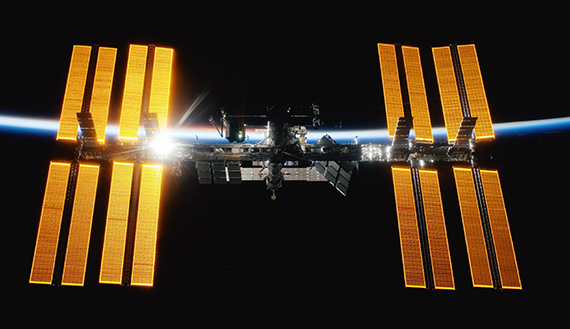|
|
|
|
 (NASA image)
New tools will help study quantum chemistry aboard the International Space StationAt NASA’s Cold Atom Lab facility aboard the International Space Station, an international team of scientists produced a quantum gas containing two types of atoms for the first time in space. The achievement, outlined in a new study published in Nature, marks another step toward bringing quantum technologies currently available on Earth into space.
Through experiments controlled remotely on Earth, the researchers produced Bose-Einstein condensates—a quantum state of matter made from an atomic gas cooled to temperatures close to absolute zero. Nicholas Bigelow, the Lee A. DuBridge Professor of Physics and a professor of optics at Rochester, says these quantum tools can be used to enhance the study of the essence of quantum matter, aid in the navigation between planets, as well as help solve mysteries of the universe and deepen our understanding of the fundamental laws of nature.
Zero gravity has its benefits.
Genomic ‘tug of war’ could boost cancer therapy
(Getty Images)
Decitabine is a drug that benefits some patients with myelodysplastic syndromes, but many patients are mysteriously resistant to it. Wilmot Cancer Institute researchers have uncovered a “genomic tug of war” in animal studies that could influence how well certain patients—and certain cancers—respond to decitabine. The same tug of war may also make developing embryos more vulnerable to environmental toxins.
Learn more about this discovery.
Team builds ‘cell atlas’ for rheumatoid arthritisThe interim chief of Allergy, Immunology, and Rheumatology and several Medical Center and national/international collaborators deconstructed more than 314,000 cells into six major subtypes. Other researchers can now use this knowledge in precision medicine, developing specific, individualized therapies. Published in Nature, the work had funding from an NIH Network grant that informed a $10 million NIH grant for the Accelerating Medicines Partnership: Autoimmune and Immune-Mediated Diseases program in 2022.
Grant boosts investigation of racial disparities in immunotherapy
PhD thesis defense: Daniel Gorman Jr., historyWednesday, December 6, 11 a.m.
Plutzik Reading Room, Rush Rhees Library
“Phantom Luminaries: Frederick Willis, Spiritualism, and Paranormal Investigators in the Age of Disruption”
Advisor: Joan Shelley Rubin
Warner School Fulbright research presentationsFriday, December 8, 1–4 p.m.
Raymond F. LeChase Hall, Room 215
Join the Warner School Fulbright scholarship recipients for presentations on their culminating projects. Refreshments will be provided. Learn more.
|
|
|
|
|